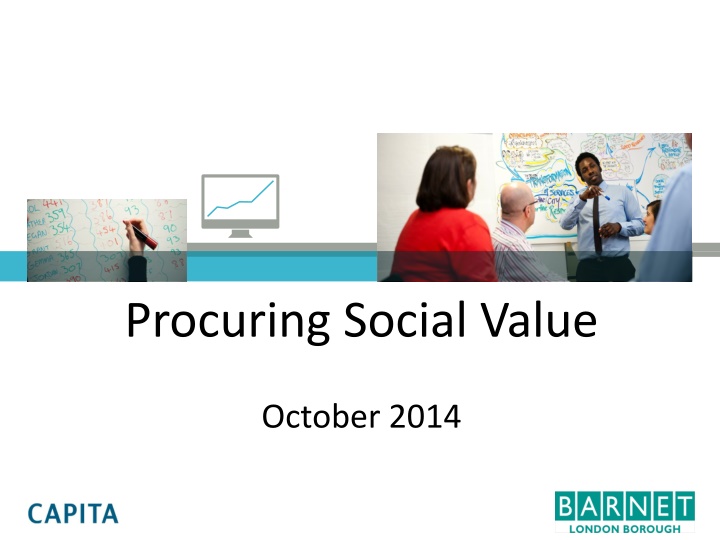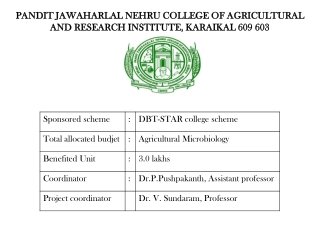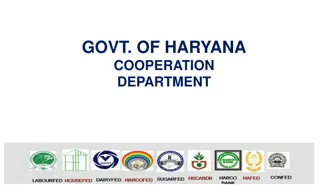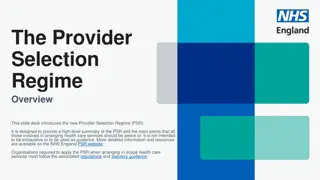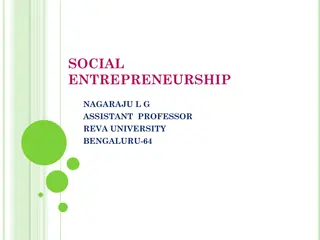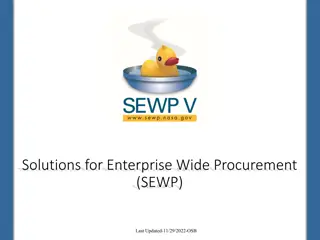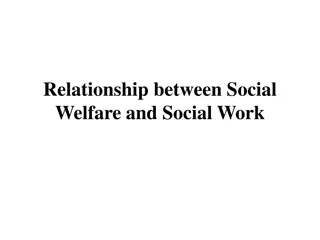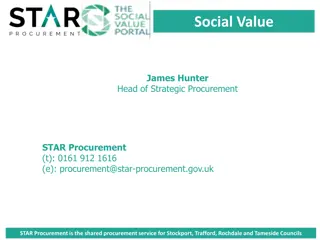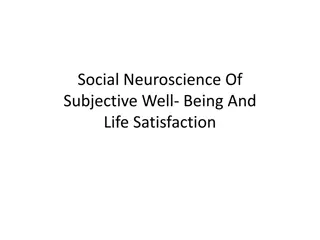Procuring Social Value
This content discusses the significance of procuring social value, focusing on the Social Value Act of 2012 and its application to public procurement. It covers the definition, examples, and benefits of social value, emphasizing its impact on the community, economy, and businesses. The content also delves into the legal aspects and practical considerations related to incorporating social value in procurement processes.
Download Presentation

Please find below an Image/Link to download the presentation.
The content on the website is provided AS IS for your information and personal use only. It may not be sold, licensed, or shared on other websites without obtaining consent from the author.If you encounter any issues during the download, it is possible that the publisher has removed the file from their server.
You are allowed to download the files provided on this website for personal or commercial use, subject to the condition that they are used lawfully. All files are the property of their respective owners.
The content on the website is provided AS IS for your information and personal use only. It may not be sold, licensed, or shared on other websites without obtaining consent from the author.
E N D
Presentation Transcript
Procuring Social Value October 2014
Agenda Definition Examples of Social Value Incorporating Social Value at Barnet Council Tendering for Social Value & stakeholder engagement Monitoring Social Value Conclusions, Next steps, Q&A
The Social Value Act 2012 Requires public authorities to have regard to economic, social and environmental well-being when procuring public services contracts and framework agreements This takes two forms; (1) how what is procured might improve the economic, social and environmental well-being for the community of London Borough of Barnet (2) how the process of procurement and associated documents can secure these improvements.
Social Value Act 2012 Legally applies to: OJEU threshold ( 172k value) procurements and above Services contracts only Does not apply to: Contracts for Goods and Works Contracts below the OJEU threshold (although EU Treaty Principles dictate best practice which covers Social Value be considered)
What is Social Value? the additional benefit to the community, from a commissioning/procurement process, over and above the direct purchasing of the goods and services .
What is Social Benefit? Social Benefit is the outcome of achieving Social Value Social Benefit can take almost any form, from the very tangible e.g. jobs for long-term unemployed, sub- contracting opportunities for SMEs, to softer benefits e.g. engaging isolated individuals back into the community
Why does Social Value matter? Get more for your money Benefits the local community, economy & businesses Enables providers to consider & reduce the negative impact of commercial activities Increases levels of innovation Expands the evaluation criteria from simply Price & Quality Improves competition, as Third Sector. VCSs, SMEs and local businesses can more easily compete Encourages partnerships between organisational types, in pursuit of delivering Social Value objectives Ultimately, it can make a great difference to people, service delivery and the bottom line.
Examples of Social Value Donations to charity Local businesses incorporated into supply chain Creating skills & training opportunities Offering work placements to school children and young adults Community engagement Targeting hard to reach groups Core Labour Standards Carbon Reduction, local deliveries etc Up skilling staff Offering Apprenticeships Local employment opportunities Volunteers Additional Services Educational visits Offering curriculum support to schools Creating Supply Chain opportunities Improving environment, landscape
Examples of Social Value Questions Asked How would your organisation contribute to Barnet Council s corporate priorities as part of this project? Please describe how you work in collaboration to deliver the maximum possible social value. What would your commitment be to local economic benefit, in terms of the local supply chain and apprentice/training opportunities?
Examples of Responses Received Improve environmental performance and reduce carbon footprint Source goods and services locally wherever possible. Maximise the number of smaller orders and despatch when the value of combined orders reach a pre-set value of XXX. Work with local suppliers, sub-contractors and agencies to supply services wherever possible. If any additional labour/trainees are required, enquiries would be made in the local community. Keeping the community informed via letters and community notice boards. Provide support for local communities through employment and training opportunities. Reductions in material wastage through onsite recycling were possible
Examples of Responses Received Pay suppliers promptly. Possibility of the donation of equipment. Provide a work experience place for a local resident. Sponsor annual awards for the best gardening/allotments. Community centre exterior cleaning completed free of charge. Provide assistance to elderly residents by clearing slippery pathways around their house/residence, free of charge. Work with local suppliers, sub-contractors and agencies to supply services wherever possible. Allocate a full week spread over a year, free of charge to undertake community work. Use of local supplier to repair and maintain equipment.
Barnets Council Priorities 1. To maintain a well designed, attractive and accessible place, with sustainable infrastructure across the borough To maintain the right environment for a strong and diverse local economy To create better life chances for children and young people across the borough To sustain a strong partnership with the local NHS, so that families and individuals can maintain and improve their physical and mental health To promote a healthy, active, independent and informed over 55 population in the borough so that Barnet is a place that encourages and supports residents to age well To promote family and community well-being and encourage engaged, cohesive and safe communities 2. 3. 4. 5. 6.
What could we be doing with existing contracts Questions to ask current providers? As part of contract management clarify: Is Social Value already being delivered via the contract? Is this Social Value documented? Can Social Value be quantified and measured? Does the impact of provider activities reduce expenditure for the Council in other areas? If yes, can this be quantified? Are social issues locally changing and how are these being met by the provider? Do your providers have a local office, employ local people, up- skill their staff, re-invest into the locality?
Tendering for Social Value Pre-procurement consultation is vital Internal stakeholders e.g. contract manager, service area technical experts, procurement External stakeholders e.g. current provider (previous slide), potential providers, other LAs, Service users It is vital to achieve, completion of an Options Appraisal with sign-off from both procurement and service area
Internal Stakeholder questions Why are we procuring this service? What are we trying to achieve? What outcomes are we looking for? Can we deliver this better? Can we deliver more than current service? How can we deliver more? Where are the opportunities to add Social value? What options should we explore further? What have others done? Are they doing it better? Are they getting superior outcomes, more outcomes? Can we deliver even more for our money? What could it look like if? What is the future need? What will this service look like in 5, 10 years?
External Stakeholder questions Questions can be asked via Soft Market Testing surveys, Workshops, Briefing events, etc Do you currently deliver Social Value via any contracts you hold? Are you willing to replicate these in Barnet? Have you seen Social Value success elsewhere? What (relevant) opportunities for delivering Social Value can you identify? Have you any plans in the pipeline?
Implementing Social Value in Procurements Two options; 1) Social value can be an Award criteria, if it is linked to the subject matter of the contract. Social benefits can then be taken into consideration and evaluated at every stage of the procurement. 2) still be included in contracts. These will be in more general terms, as performance obligations. Where this is not appropriate, Social benefits can
Social Value as Selection & Award Criteria Pre Qualification Questionnaire [PQQ]: Please provide 2 examples of how your organisation has supported targeted recruitment and training initiatives, when carrying out similar contracts Tender: Please provide a method statement detailing how your organisation will provide the social benefits set out in the award criteria Please provide a Community benefits plan, identifying the benefits which you will deliver during the course of the contract, alongside how and when the benefit will be delivered Please provide detail of management information and data sets you will provide as part of contract delivery to demonstrate social value
Social Value as Performance Obligation Acceptable contractual conditions are: Obligation to: recruit a number of unemployed persons set up training programmes (for staff or community) take on a number of apprentices recruit number of people with disabilities offering work placements to school children incorporating local businesses, third sector into the supply chain recognise and support Army Reserves
Monitoring Social Value Contract manage and monitor actual performance against the stated outcomes and benefits Identify, list and measure Social Value KPIs Feed back the results to all stakeholders Learn and continually improve Keep up with changes in the community, to ensure Social benefits are relevant Promote and communicate successes
Conclusion 1) The Social Value is a long term sustainable approach to incorporating social benefit within our commissioning and contracting activity 2) Enables Councils to contractually get more for their money without additional costs
